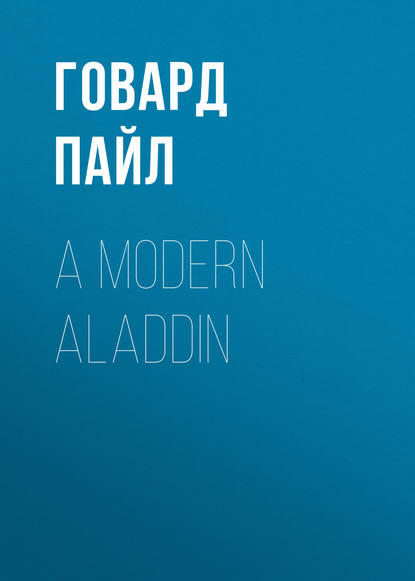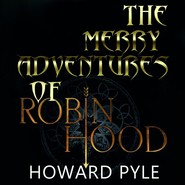По всем вопросам обращайтесь на: info@litportal.ru
(©) 2003-2024.
✖
A Modern Aladdin
Настройки чтения
Размер шрифта
Высота строк
Поля
"Only a few?" repeated the marquis. "And how much, then, do you suppose that this collection of diamonds is worth?"
"That would be hard to tell," said Oliver, smiling. "But perhaps not more than half a million livres. None of the stones are very large or fine."
"Not large? Not fine?" cried the marquis, and he picked out a diamond from among the rest. "What, then, do you call this?"
"It is off color," said Oliver.
"It is a treasure that a king might covet!" cried the marquis, enthusiastically.
Oliver laughed. "You admire it?" said he. "Then do me the favor to accept it."
The marquis rose to his feet. "Oh," he cried, "this is too much! I do not dare."
"You pain me by refusing," said Oliver. "As a connoisseur, monseigneur, as a collector – "
"Ah!" said the marquis, "there you touch me again. As a collector – well, then, I accept it," and he slipped it into his waistcoat pocket. "Embrace me, Oliver!"
Oliver's mother was long past wondering at anything, or else she might have thought it a little strange to see Oliver – Oliver, the son of Jean Munier, the tailor – clasped in the arms of Monseigneur the Marquis of Flourens.
The marquis released Oliver from his embrace and sat down again. "But tell me," said he, "you and madame, you then live here?"
He looked around, and Oliver's eyes followed his. It certainly was a poor house for one who could empty half a million livres' worth of diamonds upon a table.
"For the present," said Oliver, "yes. We have been very poor, my mother and I." He paused. The marquis's eyes were resting intently upon him, and he felt that the other waited for further explanation. He had already arranged a story, but now that the time had come to tell it, his courage almost failed. "My uncle," said he at last, "came back from America about a year ago, and found us very poor – my mother and me. He was rich." Again he paused for a moment, and then continued: "He came from Brazil, where he was the owner of a diamond mine."
"But this uncle of yours," said the marquis, "where is he now?"
"He is dead," said Oliver. "He is in heaven."
Oliver's mother heard what he said through all the buzzing of the thoughts in her head. "So, then," thought she to herself, "my brother-in-law is dead, is he?"
"And you?" said the marquis.
"I?" said Oliver. "I have inherited his fortune. It is all in diamonds."
Madame Munier pricked up her ears. She was growing interested. Her Oliver, then, had inherited a fortune.
"And your uncle's name – what was it?" said the marquis.
"His name?" said Oliver. "His name was Henri, the Chevalier de Monnière-Croix."
"The devil!" whispered Oliver's mother to herself. "I did not know that we were so well connected." She was past being surprised at anything now.
"De Monnière-Croix?" repeated the marquis. "De Monnière-Croix? The name is not familiar."
"Perhaps not," said Oliver. "My uncle was very young – a mere child – when he went to America, and for the twelve months past since his return to France he and I have been living quietly together in Paris, where he was engaged in settling his affairs."
The marquis was looking steadily at him. "Is your family of long descent?" said he.
"Not very; as I said, my father was very poor; you know, monseigneur, how sadly poor people of good family may be in the country – " He hesitated, and then stopped.
"But," said the marquis, presently, "you say your uncle is dead. Had he, then, no other heirs than you? Had he no children?"
"No," said Oliver.
"And you inherit all —all his wealth?"
"All."
"It is then considerable?"
"It is one of the greatest fortunes in France."
"Can you prove that to me?"
"I can."
"Embrace me, my dear child!"
As the marquis rode back again to the château he sat in the corner of the coach, meditating deeply over all that he had seen and heard. "The Chevalier de Monnière-Croix," he muttered to himself – "the Chevalier de Monnière-Croix." Then he suddenly aroused himself from his meditations, thrust his thumb and finger into his waistcoat pocket, and drew out the diamond that Oliver had given him. He held it in a dozen different lights, examining it keenly and critically. Finally he thrust it back again into the pocket whence he had taken it. "At least," said he, "his diamonds are real. Why, then, should he not be of noble family if he chooses? A half a million livres' worth of diamonds, and that, as he tells me, only a small part of his wealth! Very well, then, his uncle was a chevalier and he is a prince – the Prince de Golconda, if he chooses."
Oliver stood for a long while looking out of the window after the marquis's coach had driven away. He felt very uneasy; he wished that he had not told those lies; they frightened him. He felt as if he could see them already flying home again to roost. But he need not have been afraid. And then, besides, if there was a cloud, it had had a silver edge: the last words that the marquis had uttered had been: "My dear Oliver, let me hope that we may soon see you at the château – you and your mother" (that was an after-thought), "for my daughter Céleste will find it very stupid with no young people about. I shall not, however, be able to show you my collection of diamonds, unfortunately; they are at present – ahem! – in Paris."
Scene Fifth. —A garden at the Château de Flourens
A garden such as Watteau loved to paint – bosky trees, little stretches of grassy lawn, white statues of nymphs and fauns peering from among the green leaves, a statue of a naiad pouring water from a marble urn, green with moss, into a marble basin, green with moss.
In front of all, the smooth river, dusked and dappled now and then by little breezes that slowly sway the tops of the tall poplar-trees. The little birds sing, and patches of sunlight and shadow flicker upon the grass.
Enter Oliver and Mademoiselle Céleste. She carries a pink parasol that makes her face glow like a rose leaf, and Oliver walks by her side.
That morning Oliver had paid his first visit to the château. His master had trained him well in the ways of the world during the twelvemonth he had lived with him in Paris; nevertheless, he came to the château quivering with trepidation. But now the trepidation had passed and gone, and it was all like the bewildering glamour of some strange dream – the presence of his love no longer dumbly reflected from the smooth, passionless mirror, but in warm living flesh and blood, breathing and articulate. She spoke; she smiled; it was divine. A little wind blew a gauze of hair across her soft cheek now and then as they walked together; her sleeve brushed against Oliver's arm, and Oliver's heart quivered and thrilled.
That night was to him but a succession of dreams, coming one after another like a continuous panorama, only each separate picture centred in one figure, and Oliver himself walked along beside her, and told her that he loved her. It was a deliciously restless night.
After Oliver had gone home, the marquis lingered for a moment or two in madame's apartment, standing with his back to the fireplace listening while she talked to him.
"I do not like him," said she; "he is ostentatious. Who ever heard of wearing diamond knee and shoe buckles in the country? The solitaire pin in his cravat was enormous."
"It was a magnificent diamond," said the marquis.
"He is an adventurer," replied the marquise.
The marquis felt in his waistcoat pocket, and brought out the two diamonds that Oliver had given him. He held them in the palm of his hand under the nose of the marquise. "Bah!" said he; "you talk like a fool, Matilde. Do adventurers, then, give away seventy-five thousand livres' worth of diamonds as though they were chestnuts? Did you ever hear of an adventurer who carried around a half a million livres' worth of diamonds in a little box? No; he may not be an aristocrat, but he is certainly an Aladdin."
So Oliver was made welcome at the château whenever he chose to come. By the time that a month had passed, he had grown into a certain intimacy. They all liked him; even madame had condoned his diamonds and liked him. Then one morning the marquis received an astounding letter from his protégé.
"Monseigneur," it said, "I recognize in you a true and kind friend, a man of the world upon whom I can depend." (Oliver's master in Paris had done wonders for him; he really wrote very well.) "I am, monseigneur, troubled and harassed. I am young and without experience. I now have with me here my whole fortune, which consists entirely of diamonds – the gleaning of years from my American uncle's mines in Brazil. I do not think that I overestimate, monseigneur, in saying that that fortune is worth – " (I will not repeat what the figures were, they were so tremendous, so unbelievable, that the marquis laid the letter down, and gazed around him bewildered. "If this is true," said he, drawing a deep breath, "my young friend is the richest man in France." Thereupon he picked up the letter, and read the figures over again, and then over again. "He must have made a mistake of a cipher," said the marquis. But no; the amount was not only given in numbers, but written out in full – there could be no mistake. The marquis resumed the reading of the epistle.) "I am," continued the letter, "tormented with fears at having this vast amount in my house" – "I should think so," muttered the marquis to himself – "which, though at present a profound secret, may at any time be discovered. What dangers I would then be in, I leave you to judge for yourself. I have, monseigneur, no friends, no relatives, of sufficient age and experience to advise me in my difficulties. Accordingly I turn to you, who have shown me so much kindness, and beseech you that you will so far continue it – I may say increase it – as to take charge of this treasure, and advise me as to how I may best dispose of it."












